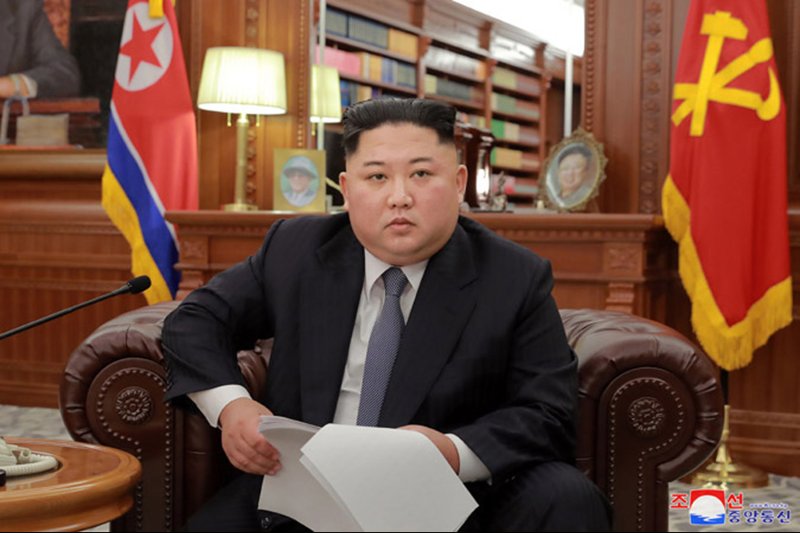This image released on January 1, 2019, by the North Korean Official News Service (KCNA), shows North Korean leader Kim Jong Un as he delivered a 30-minute New Year address on state television. Kim declared that he would have "no choice" but to act if Washington continued to ramp up sanctions on North Korea. Photo by KCNA/UPI |
License Photo
SEOUL, March 21 (UPI) -- Kim Jong Un is less forgiving than his father or biological grandfather, despite a possible change of perception in South Korea of the North Korean leader, a defector-activist said Thursday.
Ahn Myeong-chul, a former guard at North Korean prison camps and now the executive director of advocacy group NK Watch, said North Koreans are no longer being given "second chances" in the relatively isolated regime.
"The grandfather and father of Kim Jong Il did forgive offenders, regardless of crime," Ahn said at a forum organized by the Database Center for North Korea Human Rights. "You would serve time in prison but you would be subsequently released. Under the ruthless reign of Kim Jong Un, there are no second chances."
Ahn's comments come less than a month after Kim and U.S. President Donald Trump walked away from a potential deal that could have culminated in some sanctions relief in return for initial steps toward disarmament.
Before the collapse of the Hanoi summit, expectations in South Korea were fairly high the two sides would make progress; but that assumption may have been based on the dramatic image makeover the North Korean leader received as he hugged or held hands with South Korean President Moon Jae-in at the border and in North Korea.
Kim's transformation from nuclear dictator to gifted diplomat in 2018 may have eased tensions on the peninsula. But the changes have also altered South Korean public perceptions of North Korea's human rights situation, according to Yeosang Yoon, chief director of NKDB.
Yoon said Thursday there is an overall perception in the South that North Korea human rights are improving because of diplomacy. The two are in fact unrelated.
In an annual poll of 1,000 South Koreans in 2018, results show a 10 percent decrease in the number of respondents who said the North Korean human rights situation is "serious" or dire.
In 2017, as North Korea tested missiles and Kim exchanged a war of words with Trump, the poll indicated about 95 percent of those surveyed agreed North Korea human rights violations are serious; a year later, that number was down to 85 percent.
South Koreans are also more optimistic about improvements in North Korea human rights, following a year of diplomatic engagement. More than 65 percent of respondents in 2018 said conditions for North Koreans would improve, a significant increase from 2017, when less than 17 percent of surveyed South Koreans expressed similar optimism.
The spotlight on Kim and his ability to redefine himself may have obscured South Korean understanding of his capacity to persecute, imprison and torture those who disobey the rules.
Oh Kyung-sup, a researcher at the Korea Institute for National Unification, a Seoul-run think tank, said North Korea human rights have not significantly improved across all categories. He also said the transition of power from Kim Jong Il to Kim Jong Un did not make life easier for ordinary North Koreans.
Under the current leader, one area that has received a boost is North Korean access to food, the analyst said.
The improvement is likely the result of a changing attitude in the leadership about markets.
Ahn, who said he took turns being imprisoned and guarding prisons in North Korea, said Kim Jong Un permitted markets to flourish, while his father would crack down on traders. People buying and selling food had to "move around" to evade authorities under the former leader, Ahn said.
The defector, who resettled before Kim Jong Un came to power, said South Koreans could have been fooled by his diplomatic gestures.
While some prison camps have closed, others have expanded under Kim, and for a good reason, Ahn said.
"North Korea cannot survive without political prison camps," the defector said. "If human rights improve, North Korea will collapse."















